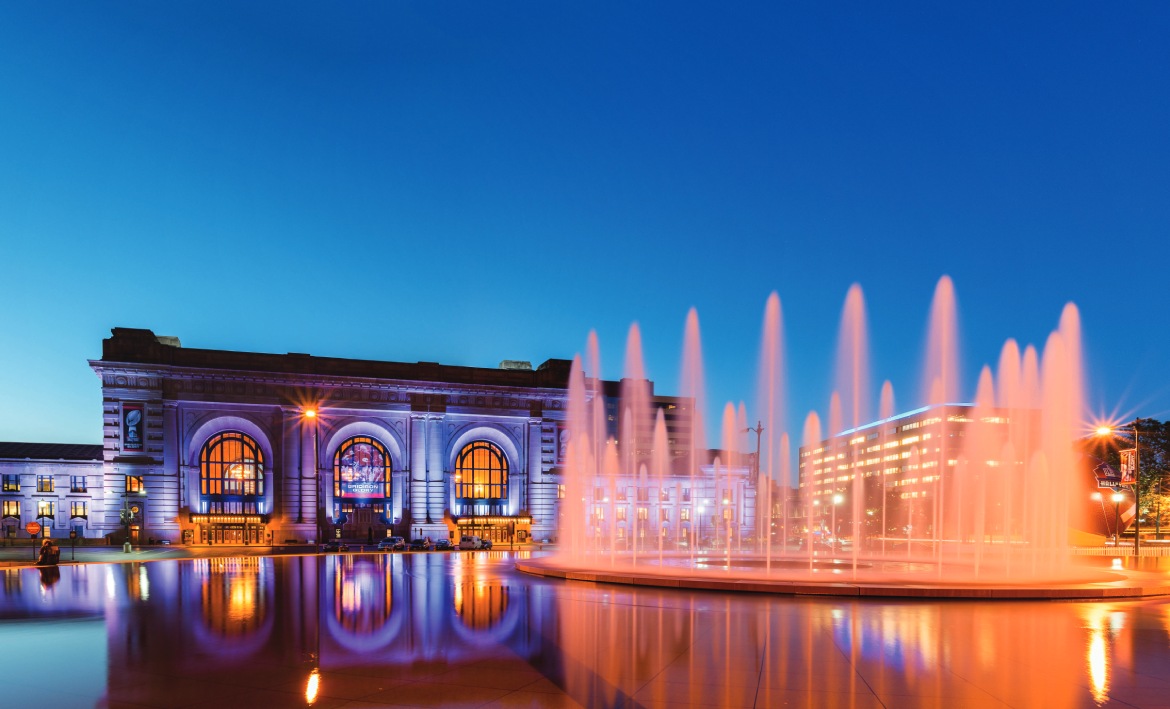The largest metropolis in the Show Me state may fly well below the gaydar of most queer travelers, but its got a knockout industrial-chic hotel, a state-of-the-art new LGBTQ night club, and a boomlet of stylish gay-owned B&Bs and restaurants.
All of this complements a clutch of first-rate museums, a forever-raging battle of barbecues, and a first-rate jazz scene. Kansas City is also home to one of the country’s most enthusiastic queer sports fandoms: beyond intense civic pride/lust over Chiefs quarterback Patrick Mahomes, it’s one of America’s most enthusiastic soccer towns and is currently constructing the first U.S. stadium built ever for a women’s pro sports team, the Kansas City Current.
The city even boasts the world’s most celebratory corrective to the marginalization of minority athletes: The Negro Leagues Baseball Museum (16 E. 18th St. Tel: 816-221-1920. nlbm.com). Particularly worth noting here is a small collection of memorabilia focused on Toni Stone, one of only three women who ever played in the leagues.
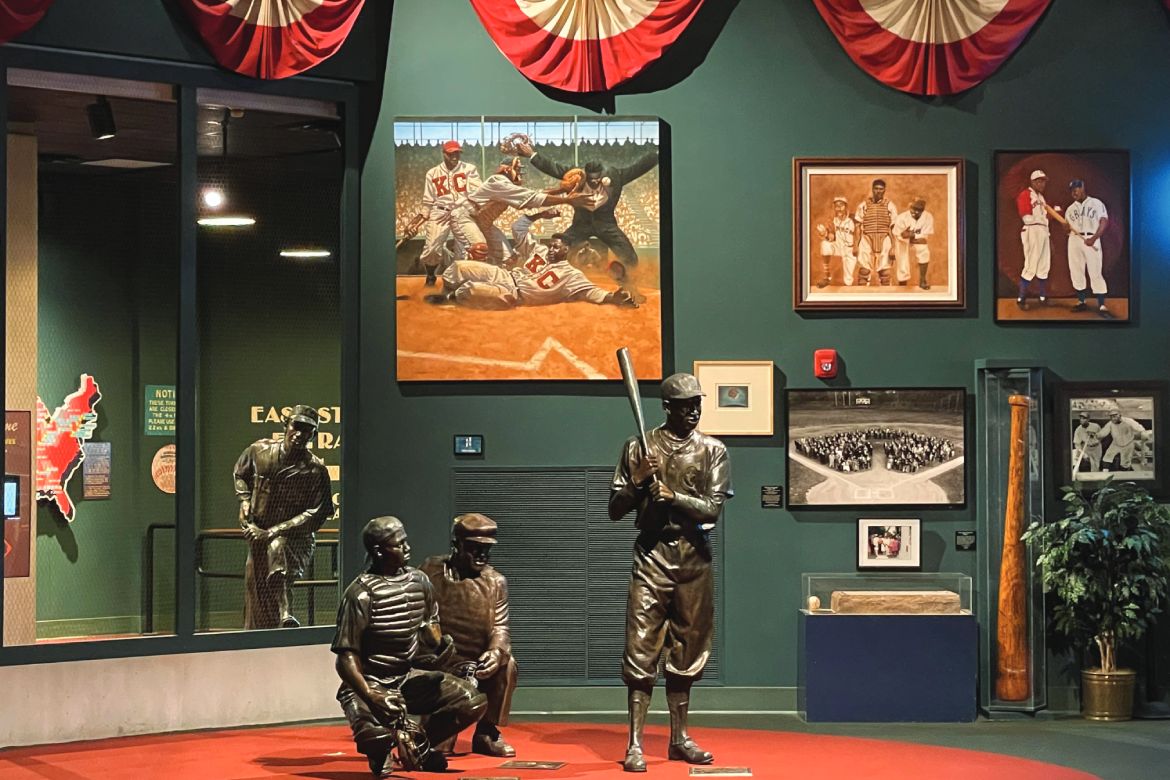
Negro Leagues Museum (Photo by Jim Gladstone)
The male-presenting Stone, who played in the 1950s was never “out” by contemporary standards, but once told a reporter “I loved my trousers, my jeans. I love cars. Most of all I loved to ride horses with no saddles. I wasn’t classified. People weren’t ready for me.”
Today, KC is more than ready to welcome queer visitors. While it was way back in 1943 that Rogers & Hammerstein composed their musical paean to the city, 80 years later its lyrics ring truer than ever: “Everything’s up to date in Kansas City.”
QUEER THROUGH THE YEARS
Kansas City’s current queer vibrance surely has some roots in the city’s 20th Century history. Between 1925 and 1939, the city was essentially commandeered by Tom Pendergast, a Tammany Hall-style political boss who, mainly without holding elected office, built a network to hold a firm grip on city and county governance and made personal a fortune by allowing Kansas City to become a hotbed of organized crime.
Rising to power in the early years of Prohibition, Pendergast assured that federal bans and strictures on alcohol distilling, sales and consumption were largely ignored on his turf, helping turn Kansas City into a metropolis booming with all manner of otherwise illegal vices.
Musicians who’d made their names in New Orleans playing to crowds that ran the gamut from tipsy to soused made their way northward along the Mississippi River transforming KC into a new capital of jazz, known as the new Storyville and home turf to rising stars like Charlie Parker.
Today, local jazz history is memorialized at a modest American Jazz Museum (1616 E. 18th St. Tel: 816-474-8463. americanjazzmuseum.org) but, more vividly, at top-notch, easily accessible live music venues including The Majestic, The Phoenix, The Green Lady and The Black Dolphin, which feature both billed and drop-in performances. (livejazzkc.com). Sexual indulgence of every stripe was also a part of the city’s flagrant rule-breaking milieu. While gay establishments were sometimes the subject of raids and busts, they were also sources of pay-offs and profit for the Pendergast machine.
Later, in the 1950 and 1960s, Kansas City had one of the country’s liveliest gay social scenes with large nightspots including The Colony Club and, most famously, the Jewel Box. A popular attraction for straight as well as gay audiences, the Jewel Box’s signature entertainment was its “Femme Mimics,” female impersonators whose musical and comedy acts drew crowds up until its closure in 1982.
In 1966, three years before Stonewall, Kansas City hosted The National Planning Conference of Homophile Organizations, where leaders of 15 local and regional LGBT advocacy groups from around the country gathered to develop The National Planning Conference of Homophile Organizations, where leaders of 15 local and regional LGBT advocacy groups from around the country gathered to develop the first national strategy and the first legal defense fund for gay rights activism around the country.
Today, thanks to the quietly impressive work of Paul Gutiérrez, Visitor Experience Director, and his colleagues at the recently renovated Kansas City Museum (3218 Gladstone Blvd. Tel: 816-702-7700. kansascitymuseum.org), key moments in the city’s queer and other civil rights movements are seamlessly woven into the official civic history exhibits in a way that recognizes them as integral to KC’s development, rather than treating them as virtue-signaling sidebars.
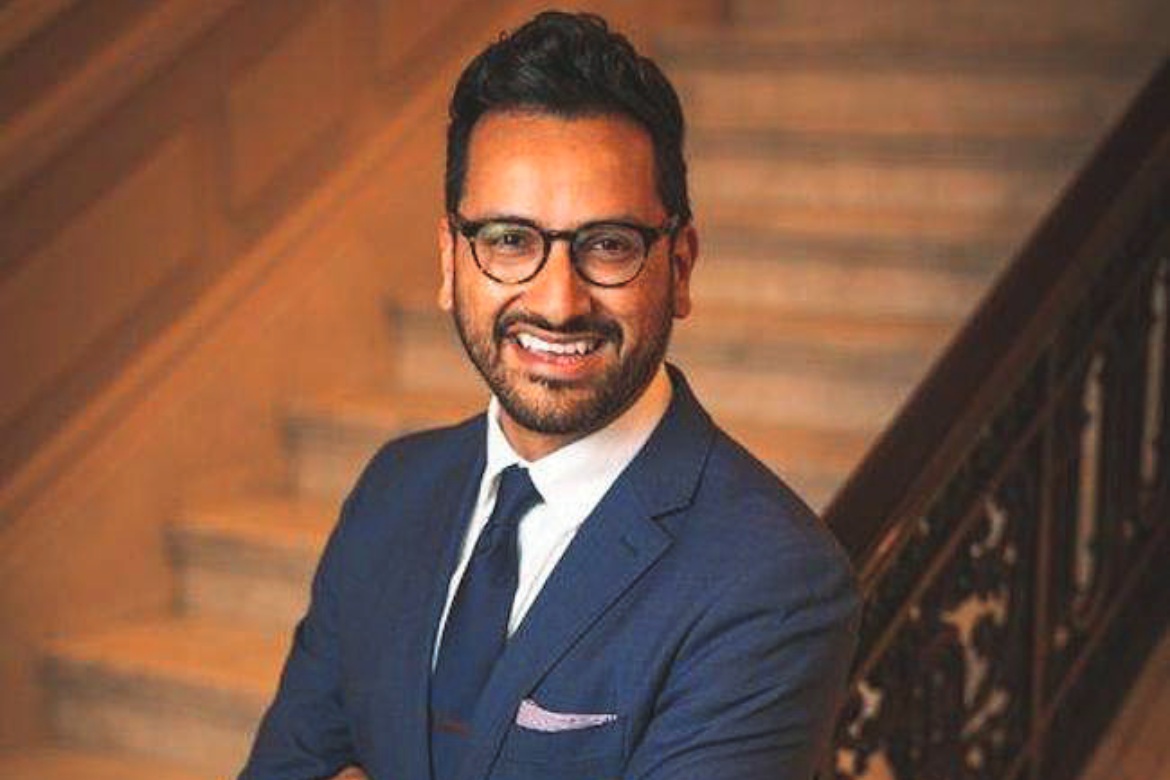
Paul Gutierrez (Photo by Kansas City Museum)
The exhibits are displayed on the upper floors of gorgeously restored Corinthian Hall, once home to the Long family, whose 19th century lumber fortune helped place them in the social circles of the Vanderbilt and DuPont dynasties. While visiting, don’t miss the mansion’s basement level, where you’re welcome to linger in the billiard room, and at Elixir, perhaps the world’s poshest soda fountain.
The most easily accessible introduction to Kansas City’s underappreciated place in LGBTQ+ history is the just-launched KC Rainbow Tour (joelspeaksout.com/rainbow-tour), a years-in-the-making labor of love by Joel Barrett, a charismatic former Baptist preacher who has embraced Kansas City and is a fixture and cheerleader of its queer community.
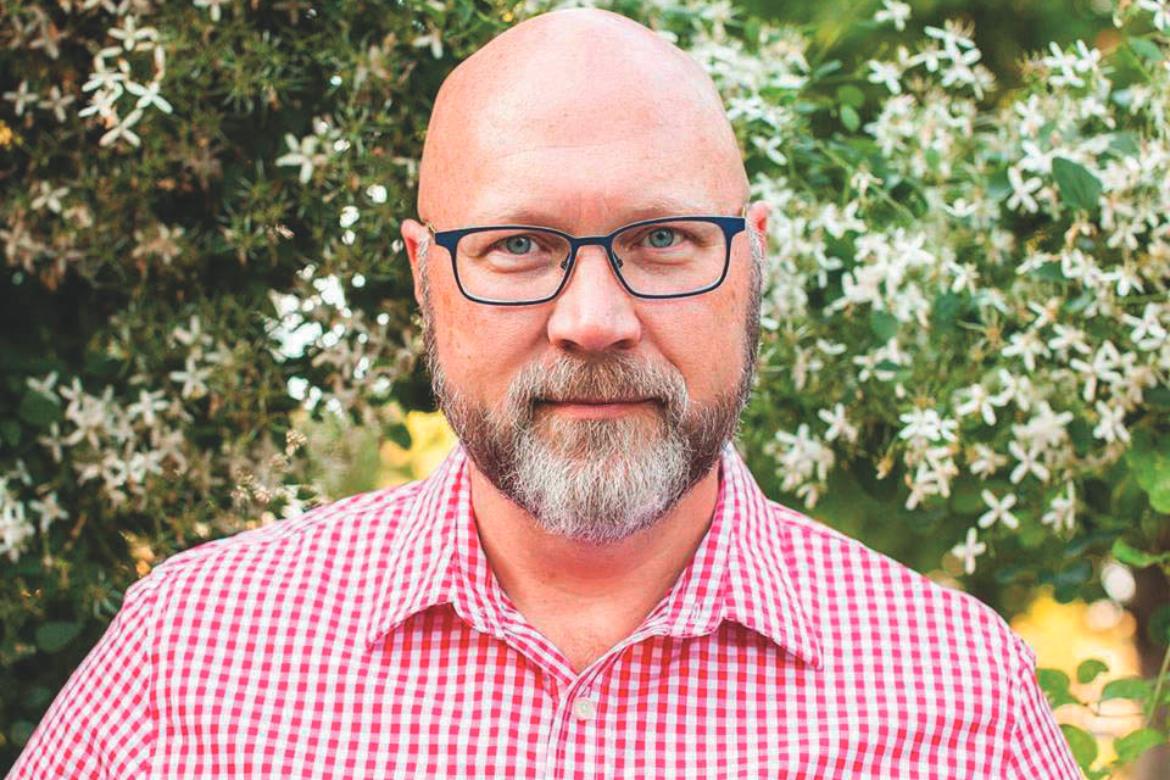
KC Rainbow Tours Joel Barrett (Photo by Joel Barrett)
Drawing on his own research and the extensive archives of the Gay and Lesbian Archives of Mid-America (GLAMA), housed at the University of Missouri in Kansas City (libweb.umkc.edu), Barrett has created a drive-yourself app-guided tour featuring coordinated navigation maps and audio clips. Its just the start of a grander project which, with plans to ultimately incorporate in person guides and long-form audio and video documentaries.
A HOTEL HANGOUT
On a recent trip to KC, I roosted at the Crossroads Hotel (2101 Central St. Tel: 866-531-2400. crossroadshotelkc.com), named for its neighborhood, the Crossroads district, a one-time industrial area that has, over the past decade, emerged as the hub of KC’s homegrown art scene.
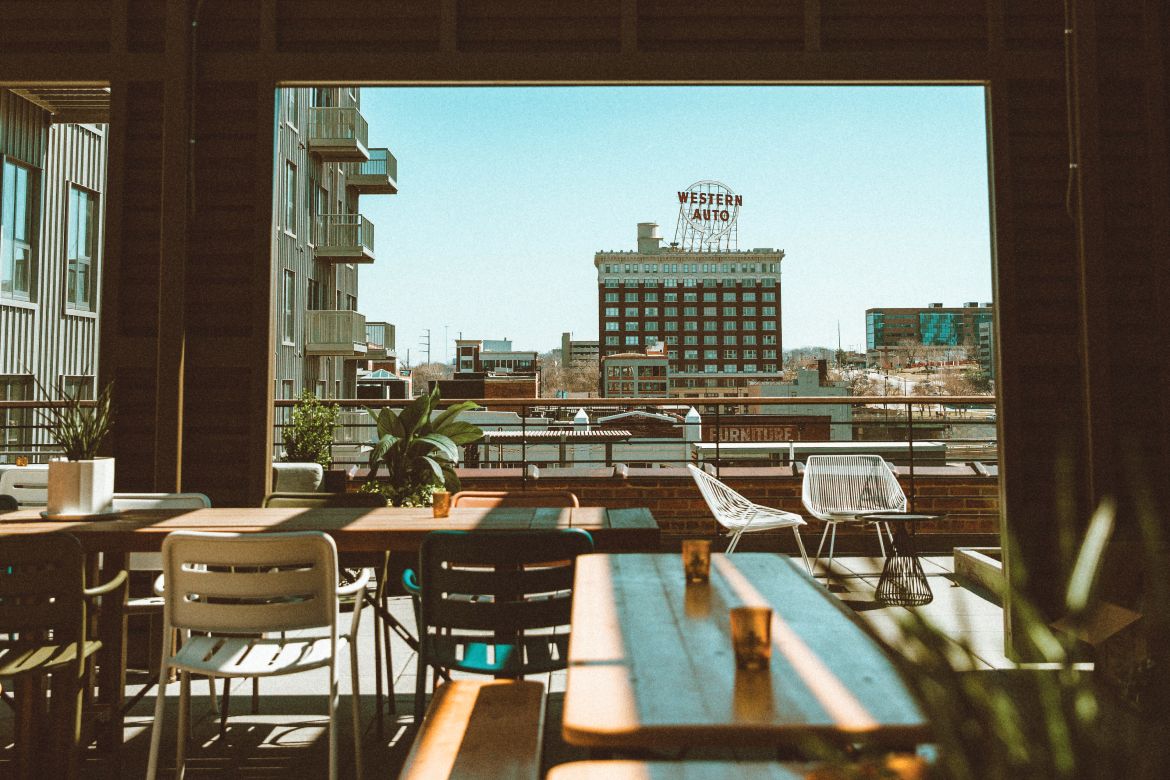
Crossroads Hotel Rooftop Lounge (Photo by Crossroads Hotel)
A rugged-luxe renovation of two low-slung brick buildings, its handsome, hangout-friendly lobby flows into a large gallery space and a skylit 4,000 square foot atrium. Girders overhead and concrete flooring echo the space’s 20th Century past as a Pabst bottling depot where horse drawn carriages loaded up with beer to distribute across town.
Today, local drafts are on tap and craft cocktails flow in the XR Café, which is open from breakfast through late night. Doing a brisk business with locals in addition to guests, it feels less like a hotel lobby than a clubhouse for cool kids.
One evening during my stay, a corner of the atrium was occupied by an adult drawing workshop, part of Crossroads’ quirky calendar of hands-on programs for guests and local community members (Yoga, art classes, a running club, and Shibari rope bondage lessons have all been offered recently).
The next morning, at the impressively early hour of 7:30, nearly 200 locals (and this gobsmacked traveler) poured into the hotel’s ballroom for free donuts, coffee, and a delightfully digressive presentation on the subject of “Truth” by award-winning KC food journalist Liz Cook. The presentation was part of CreativeMornings, an international monthly “breakfast lecture” series (creativemornings.com); the Kansas City chapter meets at Crossroads.
Crossroads’ deep engagement with the local community was pioneered by Jeremy Bennett, a former globetrotting executive for Gap, Inc. and KC native, who after moving back to his hometown was hired into the semi nebulous position of hotel Lifestyle Director.
That role is amorphous no more: Bennett’s pioneering work weaving the hotel into the fabric of local life and helping guests discover KC’s distinctive charms has led to his becoming the in-house mentor for employees in similar roles at other properties operated by the Aparium Hotel Group (aparium.com), including accommodations in similarly underappreciated cities including Detroit, Memphis, Des Moines, and Fargo.
STROLLING THE CROSSROADS
Back in the Crossroads district there are over a dozen visual arts galleries, studios, and exhibit spaces. New shows open on the first Friday of each month, when food trucks, specials at nearby bars and restaurants, and, between April and October, outdoor art fairs and street musicians make for a no-planning-necessary night on the town.
Don’t miss the Belger Arts Center’s cutting edge ceramics exhibitions (2100 Walnut St. Tel: 816-474-7316. belgerarts.org), The Bauer’s buzzing warren of individual artists’ work spaces (115 W. 18th St. Tel: 816-984-8535. thebauerkc.com), and the non-profit Mid-America Art Alliance’s (2018 Baltimore Ave. Tel: 816-421-1388. maaa.org) insightfully curated shows dedicated to the work of artists based in Kansas, Missouri, Arkansas, Oklahoma, and Texas.
The eclecticism of the art on display in the neighborhood is rivaled by the quirky offerings of local retailers. Wandering the district’s alleys, you’ll find treasure troves of vinyl records, designer skateboards, vintage menswear, and shoes for drag queens.
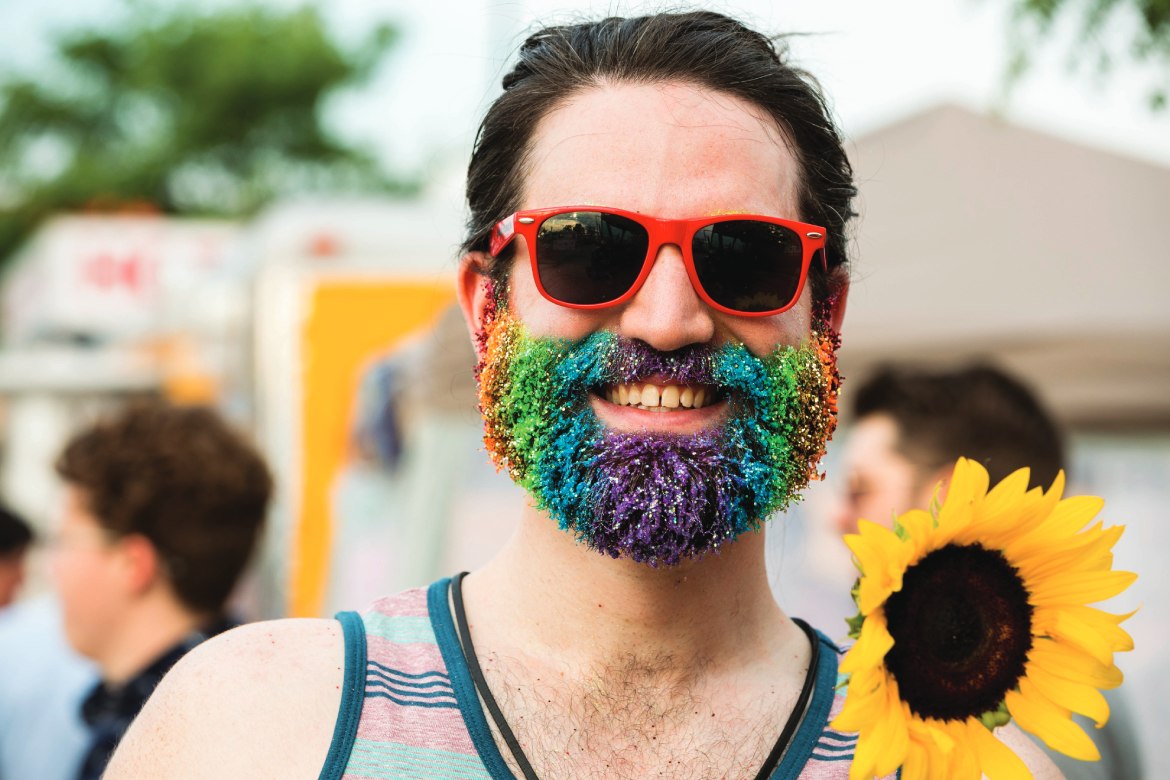
PrideFest 2017 (Photo by Steve Gibson)
At one of the three non-Iowa locations of Raygun (1803 Baltimore Ave. Tel: 816-800-0990. raygunsite.com), a liberal-minded Midwestern mini-chain, browsing the aisles feels like watching a political comedy routine (except you’re the one who’s standing up, and leaning to the left): Pick up a T-shirt that reads “Its Rainbow Time, Bitch” or a “Don’t Tread on Me Flag” illustrated with a uterus instead of a snake. How about notebooks with covers that read “Things The Supreme Court Has Done to Piss Me Off ” or “I’m Probably Just Drawing Cartoon Penises”?
Afterword Tavern & Shelves (1834 Grand Blvd. Tel: 816-299-8360. afterwordkc.com) is where you’ll find a dream combination of bookstore and bar. There’s a tight, carefully curated selection of literature and libations and knowledgeable staff members who can help you choose wisely.
And then there’s Birdies (116 W. 18th St. Tel: 816-842-2473. birdiespanties.com), a lingerie boutique owned by Peregrine Honig. A multi-disciplinary artist and entrepreneur, the San Francisco native is graduate of the Kansas City Art Institute and, at age 22, was the youngest artist ever to have work acquired for the permanent collection of the Whitney Museum.
In her shop, Honig features stylish underthings for women and men, cis and trans. She can even set you up with a custom-selected subscription service for panties and “manties.”


